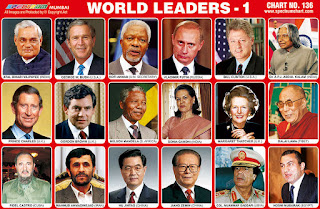 |
| World Leaders Chart |
Spectrum Chart - 136 : World Leaders 1
- Atal Bihari Vajpayee (India) - Atal Bihari Vajpayee is an Indian statesman who was the 10th Prime Minister of India. Vajpayee was a parliamentarian for over four decades. Atal Bihari Vajpayee was honoured with the Bharat Ratna award, India's highest civilian honour.
- George W. Bush (U.S.A.) - George Walker Bush is an American politician and businessman who was the 43rd President of the United States from 2001 to 2009. He is a Republican.
- Kofi Annan (U.N. Secretary) - Kofi Annan is a Ghanaian diplomat. He served as the seventh Secretary-General of the United Nations, from 1 January 1997 to 31 December 2006. Annan was the co-recipients of the 2001 Nobel Peace Prize along with United Nations.
- Vladimir Putin (Russia) - Vladímir Vladimirovich Putin is the President of Russia. Putin is the leader of the ruling United Russia party. He is originally trained as a lawyer. Putin also worked for the KGB, the Soviet Union's secret spy service.
- Bill Clinton (U.S.A.) - Bill Clinton is an American politician who served from 1993 to 2001 as the 42nd President of the United States. In 2013, he was awarded the Presidential Medal of Freedom, the highest civilian honour of the United States.
- Dr. A.P.J. Abdul Kalam (India) - Avul Pakir Jainulabdeen (A. P. J.) Abdul Kalam was the 11th President of India from 2002 to 2007. A.P.J. Abdul Kalam, was a famous Indian aerospace engineer. He was a recipient of several prestigious awards, including the Bharat Ratna, India's highest civilian honour.
- Prince Charles (U.K.) - Charles, Prince of Wales, is the eldest child and heir apparent of Queen Elizabeth II. Charles has sought to raise world awareness of the dangers facing the natural environment, such as climate change. As an environmentalist, he has received numerous awards and recognition.
- Gordon Brown (U.K) - James Gordon Brown was the Prime Minister of the United Kingdom and was the leader of the British Labour Party.
- Nelson Mandela (South Africa) - Nelson Rolihlahla Mandela was a South African anti-apartheid revolutionary, politician and philanthropist, who served as 1st black President of South Africa from 1994 to 1999. In 1962, he was arrested, convicted of conspiracy to overthrow the state and sentenced to life imprisonment, hes served 27 years in prison.
- Sonia Gandhi (India) - Sonia Gandhi is an Italian-born Indian politician, who has served as President of the Indian National Congress party since 1998. She is the widow of former Prime Minister of India, Rajiv Gandhi. In 2013, Sonia Gandhi was overall ranked 21st and 3rd most powerful woman in Forbes powerful list.
- Margaret Thatcher (U.K) - Margaret Thatcher was the first female Prime Minister of the United Kingdom. She was prime minister from 1979 to 1990. She was often known by the nickname, "the Iron Lady". As Prime Minister, she implemented policies that have come to be known as Thatcherism.
- Dalai Lama (Tibet) - Dalai Lama is a religious figure in Tibetan Buddhism. He is its highest spiritual teacher of the Gelugpa school. A new Dalai Lama is said to be the re-born old Dalai Lama. This line goes back to 1391. The 14th and current Dalai Lama is Tenzin Gyatso.
- Fidel Castro (Cuba) - Fidel Alejandro Castro Ruz is a Cuban revolutionary and politician. He was Prime Minister of Cuba from 1959 to 1976 and President from 1976 to 2008. He was in power for 49 years. Castro is a communist and he made Cuba the first socialist country of the Americas.
- Mahmud Ahmadinejad (Iran) - Mahmud Ahmadinejad is a former Iranian politician who was the sixth President of the Islamic Republic of Iran. He was an engineer and teacher before becaming a political leader.
- Hu Jintao (China) - Hu Jintao is a former President of the People's Republic of China. He served from 2003 to 2013. Hu possessed a low-key and reserved leadership style. His tenure was characterized by collective leadership and consensus-based rule.
- Jiang Zemin (China) - Jiang Zemin is a retired Chinese politician who served as President of the People's Republic of China from 1993 to 2003. Under Jiang's leadership, China experienced substantial economic growth with the continuation of reforms, saw the peaceful return of Hong Kong from the U.K. and Macau from Portugal.
- Col. Muamamar Gaddafi (Libya) - Muammar Muhammad Abu Minyar al-Gaddafi commonly known as Colonel Gaddafi, was a Libyan revolutionary, politician and political theorist. He was the ruler of Libya from 1969 to 2011. He was internationally condemned as a dictator and autocrat whose administration violated the human rights of Libyan citizens.
- Hosni Mubarak (Egypt) - Hosni Mubarak is a former President of Egypt. He was in that position from from 1981 to 2011. Mubarak exercised strong control over the country and was generally considered a dictator.

No comments:
Post a Comment